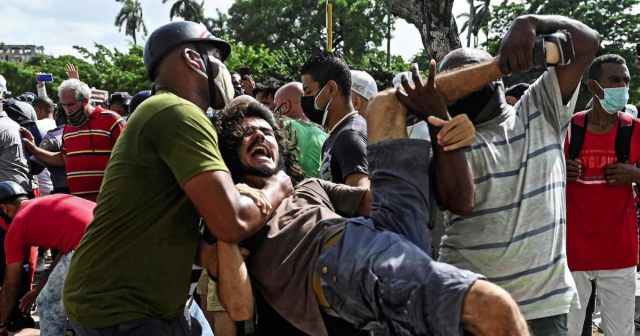On July 11, three years will have passed since the historic protests for the freedom of Cuba. In the early days of the summer of 2021, Cubans took to the streets in many parts of the country, tired of a life of sacrifice, scarcity, and resistance. Of those massive protests against the Communist Party of Raúl Castro, 600 protesters are still imprisoned out of the 1,500 detained for peacefully defending their dream of freedom. Among them, the leaders of the San Isidro Movement, Luis Manuel Otero Alcántara and Maykel Osorbo, and of the Unpacu, José Daniel Ferrer, remain in prison.
Those historic protests did not achieve the goal of restoring democratic normalcy to the largest of the Antilles. On the contrary, today the situation is incredibly more difficult and precarious. The disillusionment has resulted in a migratory avalanche that has led the country to lose 18% of its population between 2022 and 2023. Many fled out of fear of being arrested. The Island is on the brink of what economists have called the "Haitianization of Cuba." There are even think tanks openly discussing that the country is at this point a failed state. And the worst is yet to come.
The Díaz-Canel regime is prepared to repress new protests this summer, as it did on July 11th by calling on communists to confront peaceful protesters. These riots are expected amidst ongoing blackouts due to lack of money to purchase fuel; with hyperinflation, which concluded the month of May with a 31% year-on-year growth; with a government unable to control the exchange rate and with public services, such as healthcare, going through the worst crisis in their history due to a lack of investments, which have mainly been directed towards greasing the police and repressive machinery.
Cubalex, an NGO that monitors the human rights situation on the island, considers that "the causes that triggered the social unrest in 2021 are still present, showing an alarming scenario of repression and serious human rights violations." From there, they understand that the harassment of civil society comes to prevent participation in political life and the transformation of the country. The regime achieves this through the criminalization of any attempt to exercise rights on the island under penalty that those who do not like what is happening have no choice but to leave. The forced exile of activists like Omara Ruiz Urquiola, who has unsuccessfully tried to return to the country, shows the path for those who may attempt to follow in their footsteps.
Since July 2022, according to Cubalex, at least 55 people have been forced to leave Cuba. Of these, 39 have been threatened with imprisonment and 11 have been prevented from returning to the island.
To remember the political prisoners of July 11, the Inter-American Commission on Human Rights, an organ of the OAS (Organization of American States) created to monitor the compliance and defense of human rights, plans to hold a thematic hearing in Washington on Thursday (11:00 a.m.) to discuss patterns of state violence on the island.
Many Cubans on social media have remembered those historic protests from three years ago. They also remember those who are no longer with us as they are still behind bars. The images of repression make the hair on the back of the neck stand up for a population overwhelmed by famine, skyrocketing prices, and the despairing conclusion of Cuban leader Miguel Díaz-Canel, openly announcing what everyone already knows, that the country is living in a state of war economy.
Meanwhile, the regime is focusing its efforts on controlling not only those inside the island, but also those outside of it. To achieve this, they have approved three laws on Foreign Affairs, Migration, and Citizenship, which are intended to intimidate those living in exile and who have set anonymity aside to openly protest against Cuban consulates anywhere in the world.
This is something that 11J achieved, bringing thousands of Cubans out of obscurity who, either to protect their families or out of fear of eternal exile, remained silent. It also made many powerful voices of the international left turn their backs on the regime and led institutions such as the European Parliament to ban the entry of Castro supporters to their facilities. 11J was not in vain.
What do you think?
SEE COMMENTS (2)Filed under:
